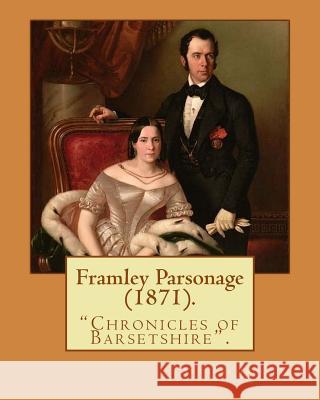Framley Parsonage (1871). By: Anthony Trollope, illustrated By: John Everett Millais (8 June 1829 - 13 August 1896) was an English painter and illus » książka
Framley Parsonage (1871). By: Anthony Trollope, illustrated By: John Everett Millais (8 June 1829 - 13 August 1896) was an English painter and illus
ISBN-13: 9781541345997 / Angielski / Miękka / 2016 / 348 str.
Framley Parsonage (1871). By: Anthony Trollope, illustrated By: John Everett Millais (8 June 1829 - 13 August 1896) was an English painter and illus
ISBN-13: 9781541345997 / Angielski / Miękka / 2016 / 348 str.
(netto: 71,28 VAT: 5%)
Najniższa cena z 30 dni: 74,84
ok. 16-18 dni roboczych
Bez gwarancji dostawy przed świętami
Darmowa dostawa!
Framley Parsonage is the fourth novel in Anthony Trollope's series known as the Chronicles of Barsetshire. It was first published in serial form in the Cornhill Magazine in 1860, then in book form in 1861.The hero of Framley Parsonage, Mark Robarts, is a young vicar, settled in the village of Framley in Barsetshire with his wife and children. The living has come into his hands through Lady Lufton, the mother of his childhood friend Ludovic, Lord Lufton. Mark has ambitions to further his career and begins to seek connections in the county's high society. He is soon preyed upon by local Whig Member of Parliament Mr Sowerby to guarantee a substantial loan, which Mark in a moment of weakness agrees to do, even though he does not have the means and knows Sowerby to be a notorious debtor. The consequences of this blunder play a major role in the plot, with Mark eventually being publicly humiliated when bailiffs arrive and begin to take an inventory of the Robarts' furniture. At the last moment, Lord Lufton forces a loan on the reluctant Mark.Another plot line deals with the romance between Mark's sister Lucy and Lord Lufton. The couple are deeply in love and the young man proposes, but Lady Lufton is against the marriage. She would prefer that her son instead choose the coldly beautiful Griselda Grantly, daughter of Archdeacon Grantly, and fears that Lucy is too "insignificant" for such a high position. Lucy herself recognises the great gulf between their social positions and declines the proposal. When Lord Lufton persists, she agrees only on condition that Lady Lufton ask her to accept her son. Lucy's conduct and charity (especially towards the family of poor priest Josiah Crawley) weaken her ladyship's resolve. In addition, Griselda becomes engaged to Lord Dumbello. But it is the determination of Lord Lufton that in the end vanquishes his doting mother........ Anthony Trollope ( 24 April 1815 - 6 December 1882) was an English novelist of the Victorian era. Among his best-known works is a series of novels collectively known as the Chronicles of Barsetshire, which revolves around the imaginary county of Barsetshire. He also wrote novels on political, social, and gender issues, and other topical matters.......... Sir John Everett Millais, 1st Baronet, PRA ( 8 June 1829 - 13 August 1896) was an English painter and illustrator who was one of the founders of the Pre-Raphaelite Brotherhood. A child prodigy, at the age of eleven Millais became the youngest student to enter the Royal Academy Schools. The Pre-Raphaelite Brotherhood was founded at his family home in London, at 83 Gower Street (now number 7). Millais became the most famous exponent of the style, his painting Christ in the House of His Parents (1850) generating considerable controversy. By the mid-1850s Millais was moving away from the Pre-Raphaelite style and developing a new and powerful form of realism in his art. His later works were enormously successful, making Millais one of the wealthiest artists of his day. While early 20th-century critics, reading art through the lens of Modernism, viewed much of his later production as wanting, this perspective has changed in recent decades, as his later works have come to be seen in the context of wider changes and advanced tendencies in the broader late nineteenth-century art world. Millais's personal life has also played a significant role in his reputation. His wife Effie was formerly married to the critic John Ruskin, who had supported Millais's early work. The annulment of the marriage and her wedding to Millais have sometimes been linked to his change of style, but she became a powerful promoter of his work and they worked in concert to secure commissions and expand their social and intellectual circles....
Zawartość książki może nie spełniać oczekiwań – reklamacje nie obejmują treści, która mogła nie być redakcyjnie ani merytorycznie opracowana.











